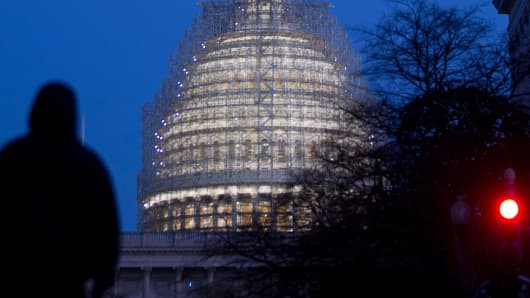Fall is approaching: leaves are beginning to change in Wisconsin, my wife is excited about pumpkin spice chai tea, and of course, the threat of yet another government shutdown is looming.
If Congress does not pass a funding measure by September 30, the federal government will be shuttered until an agreement is reached. If this sounds familiar, that's because it is. Although the federal government has only actually shut down once in the last decade, there is a shutdown threat at least annually and usually more than once a year. This uncertainty harms American businesses and our image abroad, as Congress and the President are willing to play chicken with financial chaos in order to score political points, particularly in election years.
When Republicans took back control of the House in 2010, getting our fiscal house in order was our first priority. On balance, we've had success reducing the annual deficit, but our record on passing a budget couldn't be worse: this year, the House failed to pass a budget, and only one concurrent budget resolution has been passed in the last six years. Congress is required by law to pass twelve appropriation bills annually in order to fund all federal agencies. Out of the seventy-two that were required to be passed in the last six years, two have made it to the President's desk and been signed into law.
To fill the gap, we have passed five enormous omnibus spending bills and nineteen continuing resolutions since 2010. Omnibus bills pile everything and the kitchen sink into one mammoth annual appropriation bill, and lawmakers usually have only 24 hours to read thousands of pages and no ability to amend them.
Continuing resolutions-known affectionately as CRs-are nothing more than short-term spending bills that just punt the ball forward a few months. In both cases, the contents of these measures are negotiated by Congressional leadership behind closed doors, denying elected representatives the chance to weigh in on how their constituents' tax dollars are spent.
The good news is that there is budget process reform legislation with broad bipartisan support in both houses of Congress that would take the first steps necessary to correct this problem. My bill, the Biennial Budget and Enhanced Oversight Act, would move budgeting to a two-year system, removing budgeting from contentious election years and allowing Congress to spend the second year in each biennium fulfilling the oversight responsibilities we currently neglect.
Two hundred and thirty-seven House Members support the bill—one hundred and eighty-two Republicans and fifty-five Democrats, including bipartisan majorities of the Budget and Ways and Means Committees. Senator Isakson has a similarly popular bill in the Senate, and even the Chairman of the Senate Budget Committee, Senator Mike Enzi, is pushing hard for budget process reform.
It's tough to imagine that House leadership would let another year pass without voting on a widely-supported bill that would go a long way in fixing a widely-acknowledged problem, but with only a few congressional work weeks left this year, the verdict seems clear. Unfortunately, the failure to fix our broken budget system is more about lack of interest than lack of ability. It's one thing to defend the status quo when the results support it; in this case it's defending the indefensible.
This fall, I am imploring my colleagues in Congress to do better. We have failed the American people by not doing our most basic job over and over. When we pass the twentieth stopgap funding measure of my time in Congress, let's finally address the broken process that keeps leading us here.
Let's use these last few weeks to work together to move legislation incorporating provisions from my Biennial Budgeting and Enhanced Oversight Act and the budget reform proposals of Senators Enzi and Isakson. I, for one, would like to make a change that we can share proudly with people at home and even more importantly, I would like to make a change because, simply stated, we are the only ones who can.


